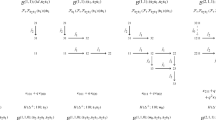Abstract.
Let \( (R,{\frak m},k) \) be a Noetherian local ring of prime characteristic p and d its Krull dimension. It is known that for an \( \frak m \)-primary ideal I of R and a finitely generated R-module N the limit \(\lim \limits_{n\to \infty } l_R(N/I^{[n]}N)/p^{dn}\) exists where I [n] denotes the ideal of R generated by \( x^{p^n} \), \( x \in I \), and l R (M) the length of an R-module M.¶ We will show that the ordinary generating function¶¶\( \sum _{n = 0}^\infty l_R (N / I^{[n]} N) t^n \in {\Bbb Q} [[t]] \)¶¶of the Hilbert-Kunz function \( {\Bbb N} \to {\Bbb N}, n \mapsto l_R (N/I^{[n]}N) \) is rational, i.e., an element of \( {\Bbb Q} (t) \), if R (1) is a finite R-module, N a maximal Cohen-Macaulay module and R is of finite Cohen-Macaulay type, i.e., the number of isomorphism classes of finite, indecomposable maximal Cohen-Macaulay modules over R is finite. From this result, we deduce that \( \lim _ {n\to \infty } l_R (N / I^{[n]} N) / p^{dn} \in {\Bbb Q} \). Here R (1) denotes R considered as an R-algebra via the Frobenius map \( R \to R, x \mapsto x^{p} \). Actually we will consider a somewhat more general situation using the Frobenius functor.
Similar content being viewed by others
Author information
Authors and Affiliations
Additional information
Received: 15.3.1996
Rights and permissions
About this article
Cite this article
Seibert, G. The Hilbert-Kunz function of rings of finite Cohen-Macaulay type. Arch. Math. 69, 286–296 (1997). https://doi.org/10.1007/s000130050123
Issue Date:
DOI: https://doi.org/10.1007/s000130050123



